Top 10 Best Private AI Models in 2026 (Tested and Reviewed)
An IBM report revealed that 51% of IT leaders have delayed or scaled down AI initiatives due to data privacy concerns—driving a strong shift toward private AI. In this guide to the best private AI models of 2026, we’ll explore the models redefining how organizations use artificial intelligence while keeping complete control over their data and operations.
Here is what we are going to cover:
- What are private AI models and their key advantages
- How to access and deploy private AI models in your organization
- Quick overview of the top 10 private AI models available today
- Detailed analysis of each model including features, pricing, and user feedback
- How Elephas enhances private AI models with knowledge management
By the end of this article, you'll understand each model's unique strengths and limitations, helping you choose the perfect private AI model for your specific needs, budget, and security requirements.
Let's get into it.
Quick Glance at Best Private AI Models
- DeepSeek R1: Companies wanting GPT-4 level performance with complete freedom and low costs
- Claude Enterprise: Privacy-focused companies needing an AI assistant for privacy
- Mistral Medium 3: Businesses wanting cutting-edge AI performance without breaking the budget
- GPT-5 Enterprise via Azure: Microsoft ecosystem companies wanting the newest AI smarts built into their tools
- Solar Pro 2: Companies needing top-tier AI performance from a smaller, more efficient model
- Kimi K2: Large-scale AI tasks requiring massive intelligence for coding, data work, and tool coordination
- Luminous: Government and regulated industries needing transparent AI that follows European data laws
- Velvet 14B: European businesses wanting energy-efficient multilingual AI for cloud, office, or edge deployment
- Devstral: Software teams wanting a free AI coding assistant that can explore projects and use development tools
- Huawei PanGu: Large organizations in finance, government, and manufacturing needing customizable AI with complete data control
1. DeepSeek R1 - Open Source AI That Rivals the Giants
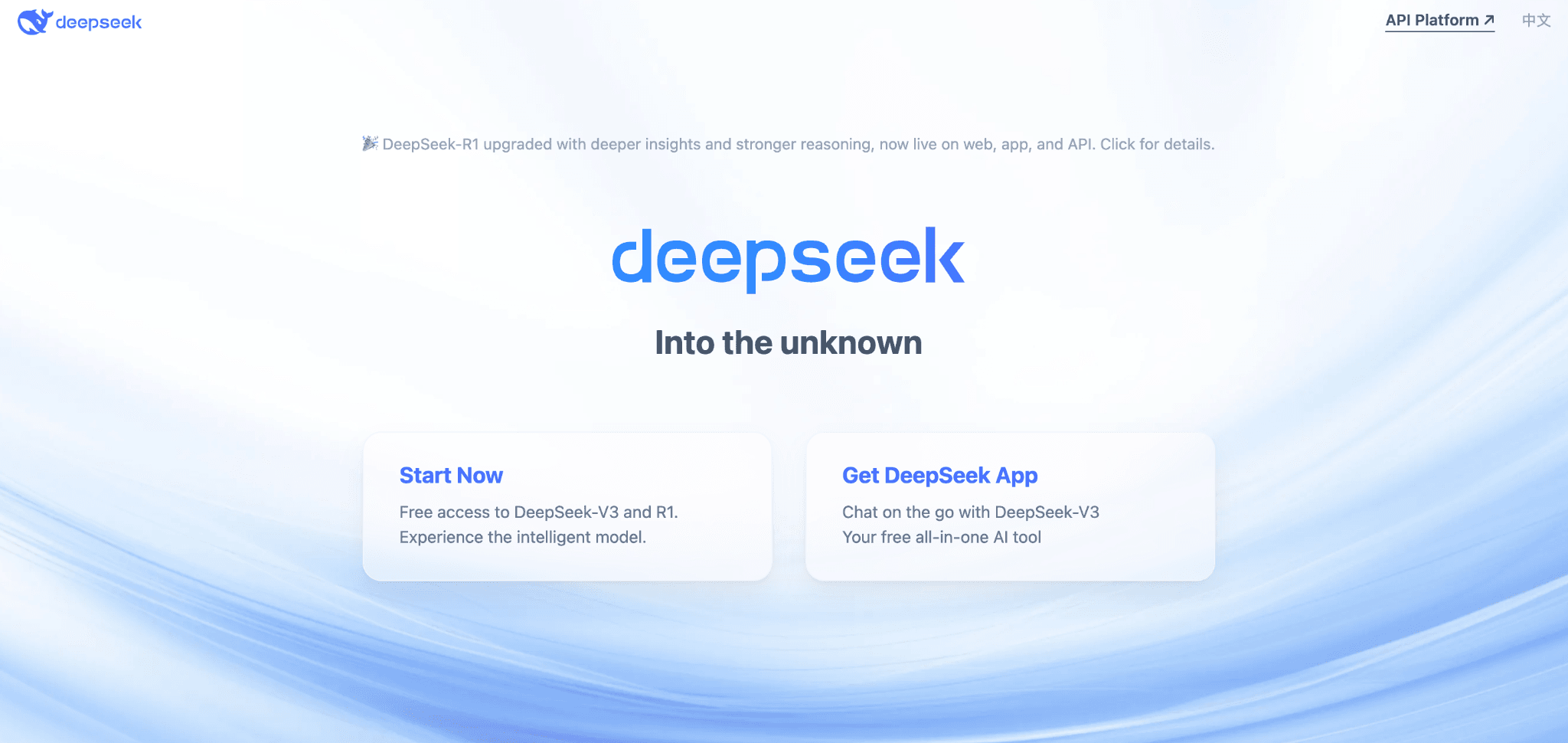
Best for: Companies wanting GPT-4 level performance with complete freedom and low costs
DeepSeek R1 shook the AI world when it launched in January 2025. This Chinese-built model matches GPT-4 quality but was created for just $6 million instead of $100+million. DeepSeek-R1’s outputs are comparable in quality to GPT-4 and Anthropic’s o1 on many benchmarks, excelling particularly in reasoning tasks (the ‘R’ in R1 stands for Reasoning).
The model (and its subsequent “V3” version) uses around 135B parameters (reports vary, possibly MoE architecture) and is open-weight under an MIT License meaning anyone can use or modify it freely.It’s also extremely energy-efficient: DeepSeek used roughly one-tenth the computing power of Meta’s LLaMa 3.1 to achieve similar results.
Key Features:
- Free Open Source: Complete freedom to use and modify under MIT license
- Ultra-Efficient Training: Built with 10x less computing power than similar models
- GPT-4 Level Performance: Matches top AI models in quality and reasoning
- Low Running Costs: Needs much less hardware to operate effectively
- Strong Chinese Language: Excellent at Chinese tasks while supporting many languages
- Community Support: Active community creating improvements and add-ons
Pricing:Free to download and use.
User Reviews:
"DeepSeek-R1 performs on par with GPT-4, Llama 3.1, and Claude – and comes with a substantially cheaper price tag” knowledge.inseed.edu
“I've asked Deepseek R1 a high-school olympiad level problem, original one (not previously posted on the net) and it failed spectacularly” Reddit
2. Claude Enterprise - Your Secure AI Team Member
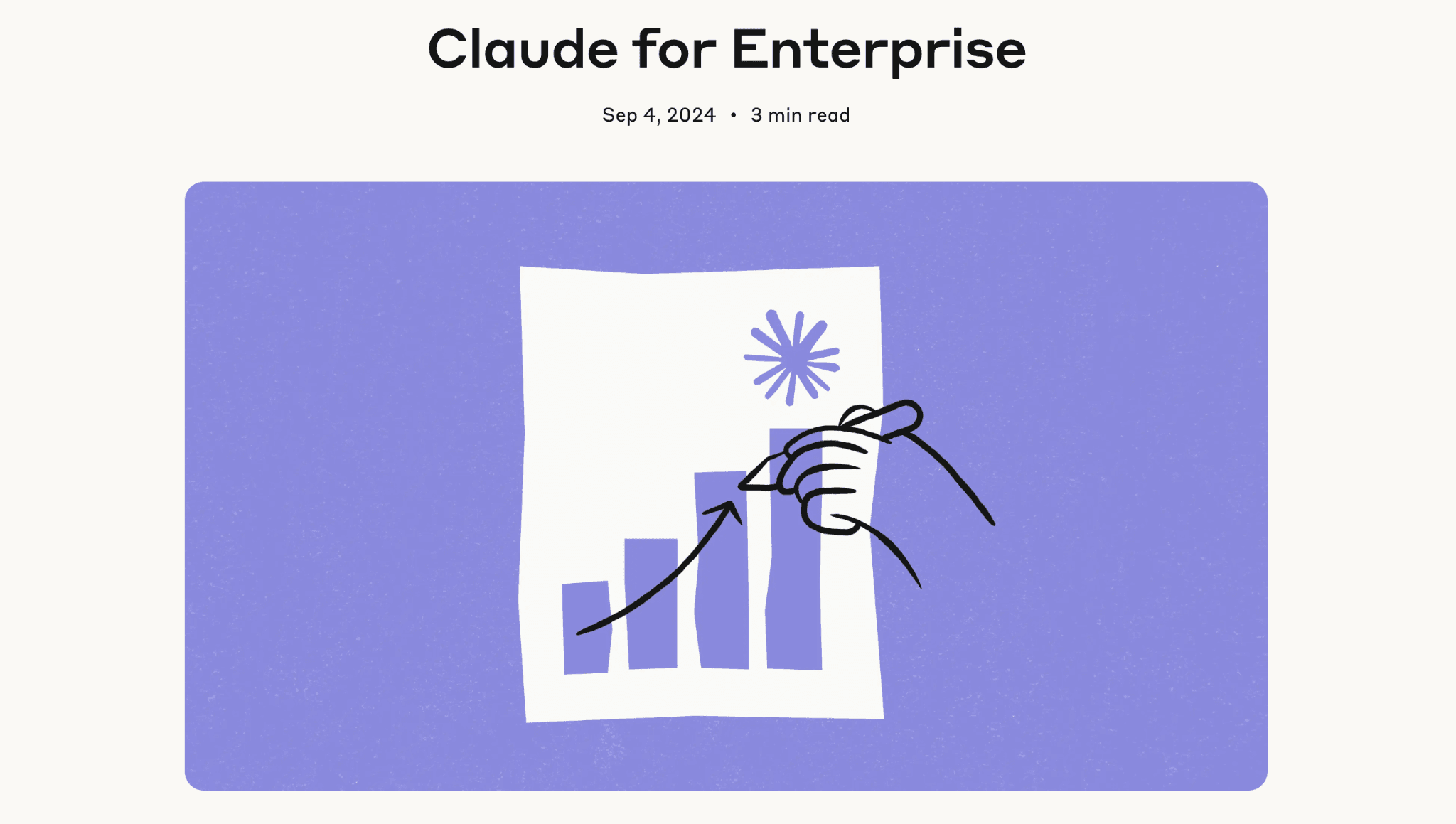
Best for: Privacy-focused companies needing an AI assistant that won't leak your secrets
Claude Enterprise is Anthropic’s private, business-focused offering of their Claude AI assistant. It’s not a single model but rather a package (Claude 2 and Claude Instant models with enterprise features) designed for companies that require secure, reliable AI deployments beyond the standard public chatbot.
Claude Enterprise comes with enhanced data protection – Anthropic promises that it does not train on your inputs and provides tools for data retention control. Key capabilities include a very large context window (currently up to 100K tokens in Claude 2, and an expanded 500K context in the Enterprise plan), allowing Claude to ingest extensive internal knowledge bases or code repositories.
Key Features:
- Massive Context Window: Can process up to 500,000 words at once
- Zero Data Training: Your information never gets used to improve the base model
- Enterprise Security: Single sign-on, user roles, and activity tracking included
- GitHub Integration: Works directly with your private code repositories
- Smart Collaboration: Teams can work together on projects with shared memory
- Flexible Deployment: Available through cloud or private server setups
Pricing: Custom pricing based on company size and usage.
User Reviews:
I switched to Claude mainly because of the 200k context, coupled with its GPT-4-level intelligence, it’s the best currently. Reddit
My bottom line is if you’re gonna have one tool for work, it’s ChatGPT. But if you can afford 2, or if you’re specifically working in content / marketing - get Claude, ideally on top of ChatGPT. Reddit
3. Mistral Medium 3 - European AI Excellence
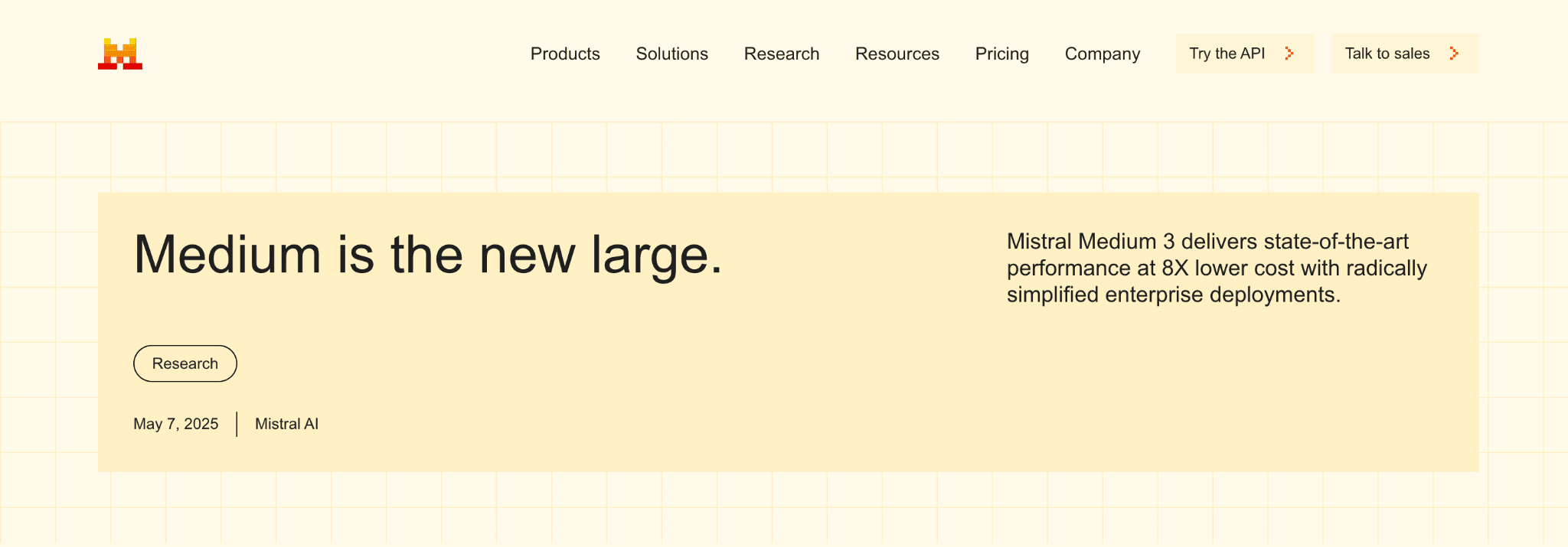
Best for: Businesses wanting cutting-edge AI performance without breaking the budget
Mistral Medium 3 is a high-performing enterprise-ready AI model from French startup Mistral AI. It delivers state-of-the-art capabilities at a fraction of the cost of comparable models. Available via Mistral’s API and through cloud platforms like AWS SageMaker, it can even be self-hosted on modest hardware (e.g. 4 GPUs).
Mistral AI, founded in 2023 and backed by over $1.2 billion in funding, designed Medium 3 for professional use cases. The model excels at coding and STEM queries, and it handles multimodal inputs with ease.
Early enterprise testers in finance, energy, and healthcare have used Medium 3 to enrich customer service and automate workflows, demonstrating its adaptability to complex, domain-specific tasks.
Key Features:
- Cost Effective: Delivers premium results at $0.40 per million input words
- Enterprise Ready: Supports private cloud and custom training options
- Coding Specialist: Particularly strong at programming and science problems
- Multimodal Support: Handles both text and images for richer understanding
- Flexible Hosting: Works on AWS, your own servers, or Mistral's cloud
- Continuous Learning: Can be further trained on your company's specific data
Pricing: $0.40 per million input tokens, $2.00 per million output tokens.
User Reviews:
"German is way better with Mistral" - User praising multilingual capabilities on Reddit
"It's worse than DeepSeek models but API costs more... Why would anyone spend money on this?" - Critic questioning value on Reddit
4. GPT-5 Enterprise via Azure - Microsoft's Latest AI Integration
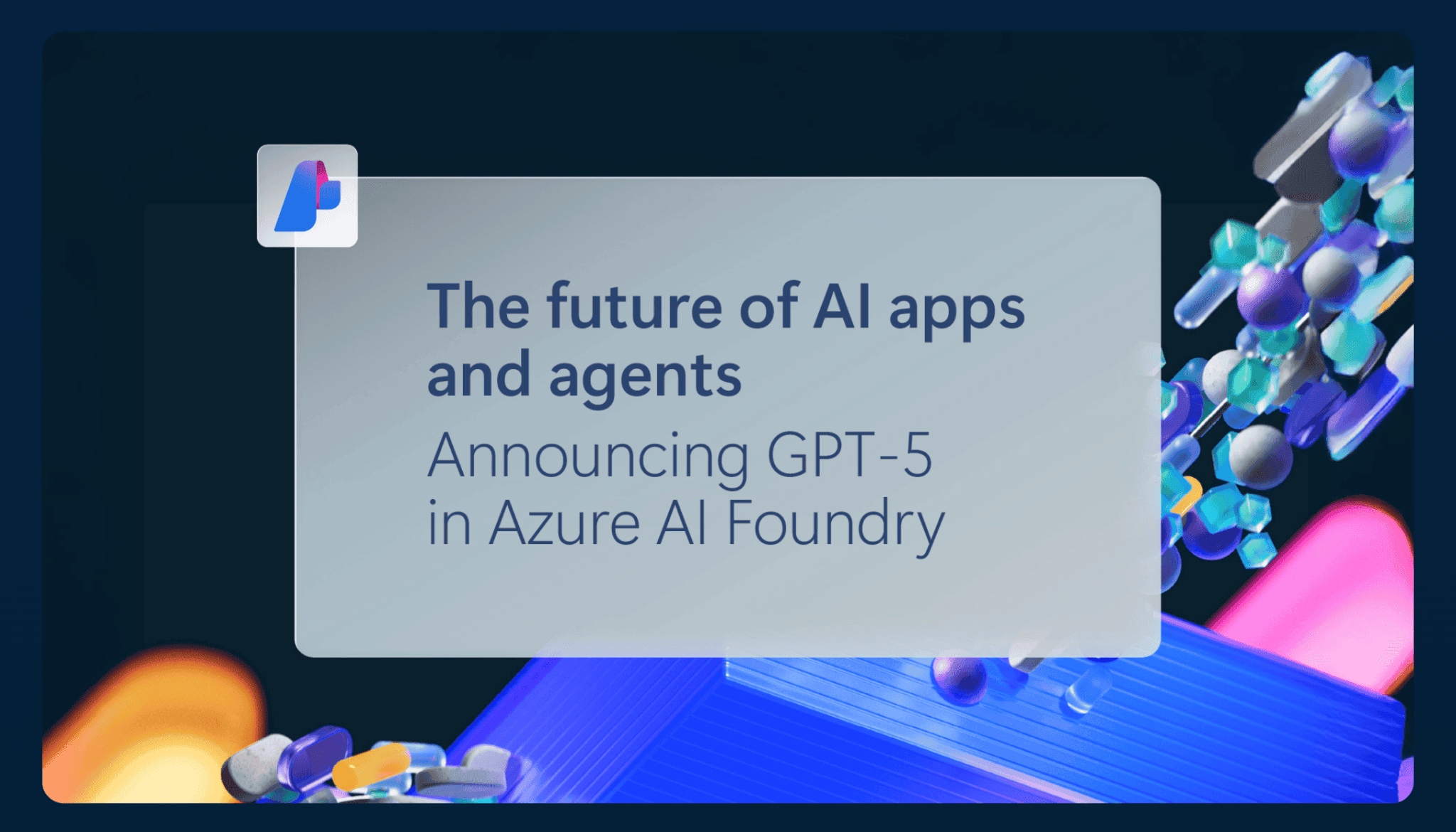
Best for: Microsoft ecosystem companies wanting the newest AI smarts built into their tools
GPT-5 Enterprise brings OpenAI's latest breakthrough directly into Microsoft Office, Teams, and other business tools. It automatically picks the right AI power level for each task.
Notably, Microsoft introduced a “Smart Mode” in Copilot powered by GPT-5. This Smart Mode automatically switches between models or approaches depending on the task – for instance, using deeper reasoning (GPT-5’s full power) for complex queries but a faster, lighter model for simple requests.
With Azure OpenAI Service, enterprises also get data privacy (Azure ensures that prompt data isn’t used to retrain models, similar to OpenAI’s policy) and the ability to deploy GPT-5 in Azure regions of their choice to meet compliance.
Key Features:
- Smart Mode Switching: Automatically uses the right AI power for each task
- Deep Office Integration: Built into Word, Excel, Teams, and other Microsoft apps
- Model Router System: Directs questions to the best AI model automatically
- Multimodal Enterprise Chat: Handles text, images, and tables in business conversations
- Improved Reasoning: 30% better at coding and complex problem solving than GPT-4
- Scalable Infrastructure: Guaranteed uptime and performance through Azure
Pricing: Usage-based billing through Azure, estimated around $0.04-$0.08 per 1,000 tokens. Many features included free for existing Copilot subscribers.
User Reviews:
"With GPT-5, Microsoft 365 Copilot is better at reasoning through complex questions, staying on track in longer conversations and understanding the user’s context,”- The Verge
"Azure Foundry with GPT-5 is powerful but expensive. Worried about blowing budgets until the router is tuned properly" - IT admin on Reddit
5. Solar Pro 2 - Korea's Efficiency Champion
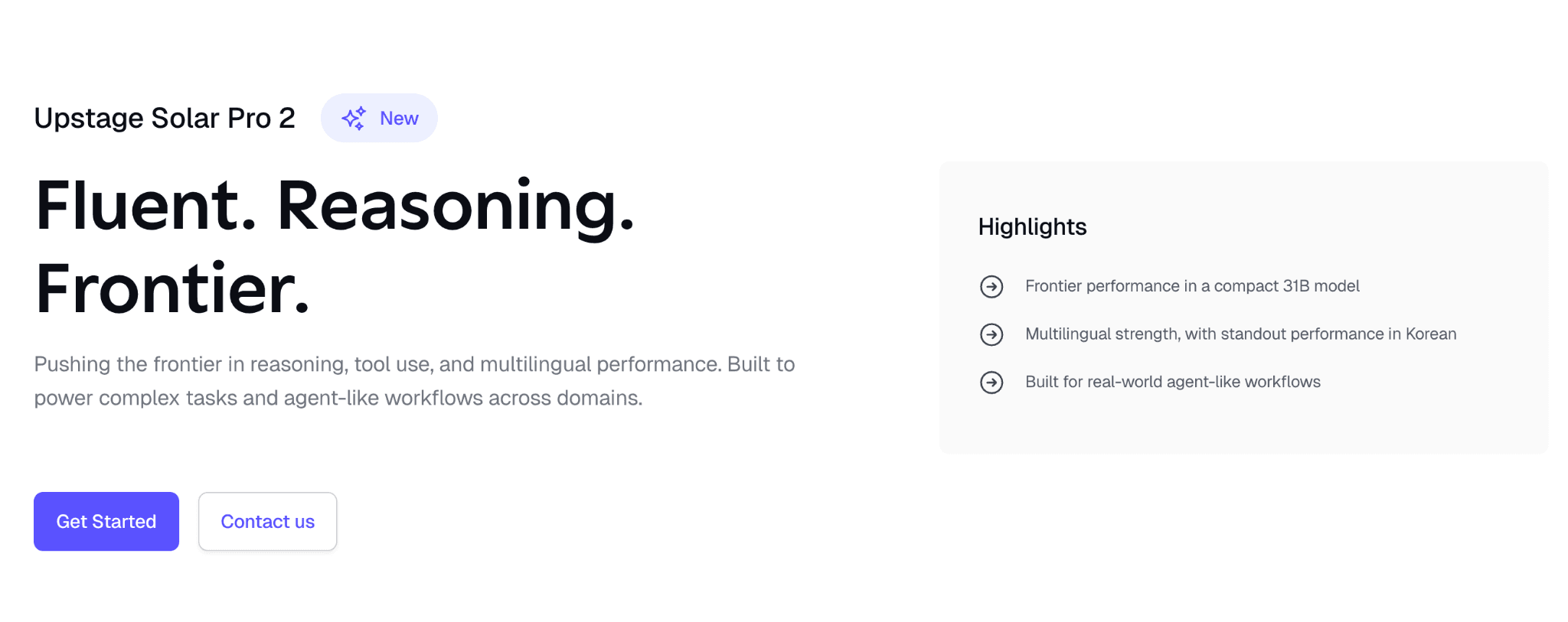
Best for: Companies needing top-tier AI performance from a smaller, more efficient model
Solar Pro 2 shocked everyone by beating much larger AI models despite having fewer parts. This Korean creation scored higher than Claude and GPT-4 on intelligence tests. In fact, on an international intelligence index, Solar Pro 2 scored 58 – higher than Anthropic’s Claude 3.7 (53) and OpenAI’s GPT-4.1.
This model was trained on over 4 trillion tokens across multiple languages and domains, and features a hybrid architecture that allows it to operate in two modes: Chat Mode for fast conversational exchanges and Reasoning Mode for more complex, step-by-step problem solving. It can also use tools by itself, like searching the web and creating files without human help.
Key Features:
- Frontier Performance: Outscored GPT-4.1 and Claude 3.7 on intelligence benchmarks
- Dual Operation Modes: Quick chat mode and deep reasoning mode available
- Autonomous Tool Use: Can search web and create files during conversations
- Resource Efficient: Runs on modest hardware while delivering premium results
- Multilingual Excellence: Particularly strong in Korean with global language support
- Vertical Optimization: Fine-tuned for finance, medicine, and legal applications
Pricing: API pricing expected around $0.3 per million tokens.
User Reviews:
"Solar 2 scoring 58 on the index is huge – it beat GPT-4.1 and Claude! And it's only 31B... that's some serious optimization" - AI researcher on Korea Tech Desk
“I will say based on the demo, it is quite a capable model, but that context length is really short. So for most coding or creative tasks, this model ain't gonna cut it.” Reddit
6. Kimi K2 - The Trillion Parameter Giant
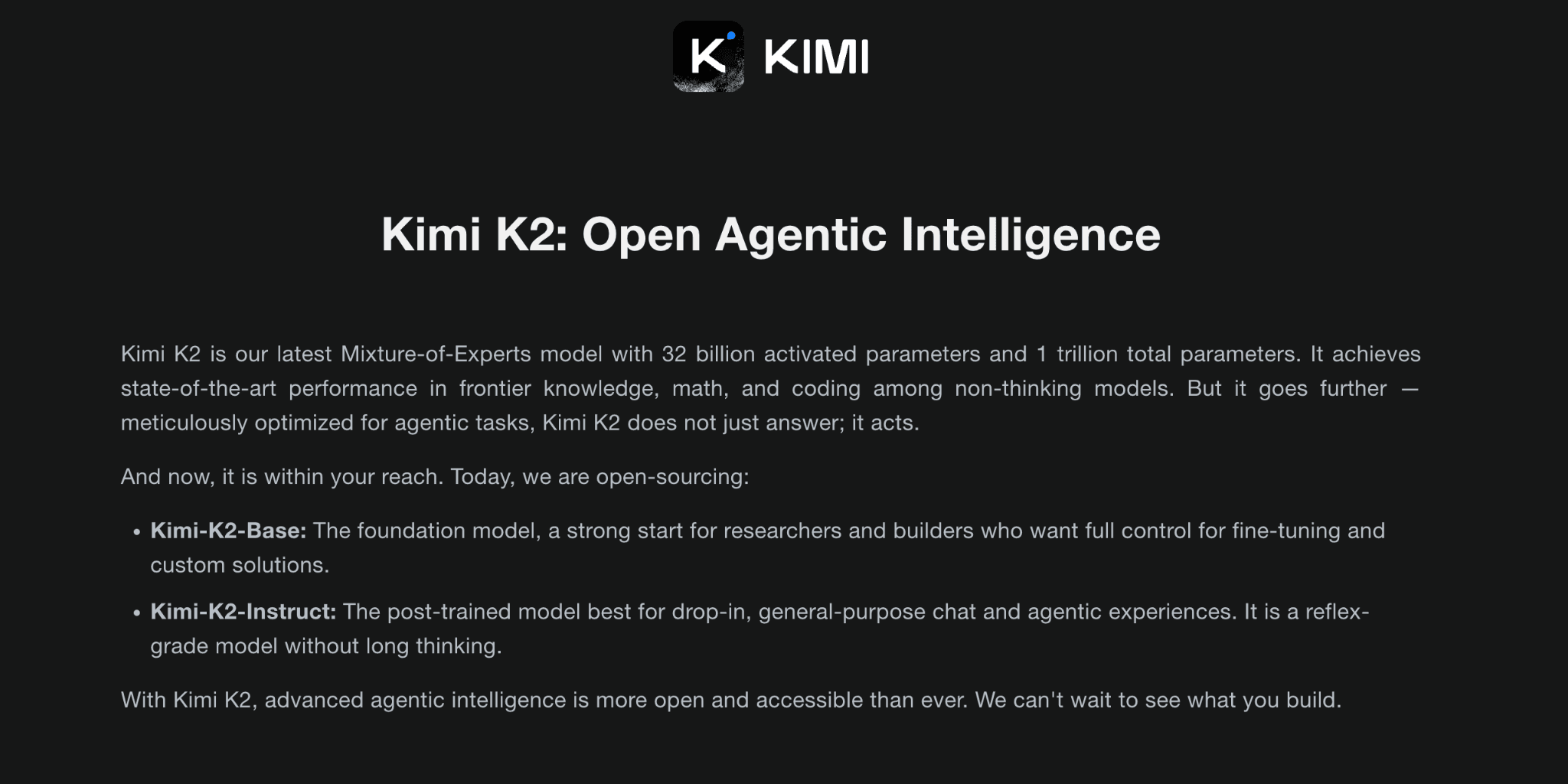
Best for: Large-scale AI tasks requiring massive intelligence for coding, data work, and tool coordination
Kimi K2 is a groundbreaking trillion-parameter AI model released by Beijing-based Moonshot AI in July 2025. Built on a Mixture-of-Experts (MoE) transformer architecture, it effectively functions like a 32B-parameter model per token (with 1 trillion total parameters spread across experts).
This design gives Kimi K2 the knowledge and reasoning ability of a ultra-large model while keeping runtime costs closer to a smaller model. Moonshot open-sourced Kimi K2 under a permissive MIT-style license, enabling enterprises to freely inspect, self-host, and fine-tune it.
Key Features:
- Trillion Parameter Scale: Massive 1T parameters with efficient 32B active processing
- MIT-Style License: Fully open for inspection, modification, and commercial use
- Massive Context Window: Handles 128,000 words of input in single conversations
- Agentic Intelligence: Excels at complex multi-step workflows and tool orchestration
- Efficient Architecture: Delivers huge model power at smaller model costs
- Enterprise APIs: Compatible with OpenAI and Anthropic interfaces for easy adoption
Pricing: Free open-source model. Enterprise hosting and support services available through contracts with Moonshot AI.
User Reviews:
"Kimi-K2 is indeed amazing. I tried Kimi on a few coding problems that Claude was spinning on. It's good... clearly powerful" - Developer on Reddit
"Way too big to run locally, but clearly powerful. Once you get past 100B, architecture and training data quality become key" - Technical observer on smythos
7. Luminous - Europe's Privacy-First AI
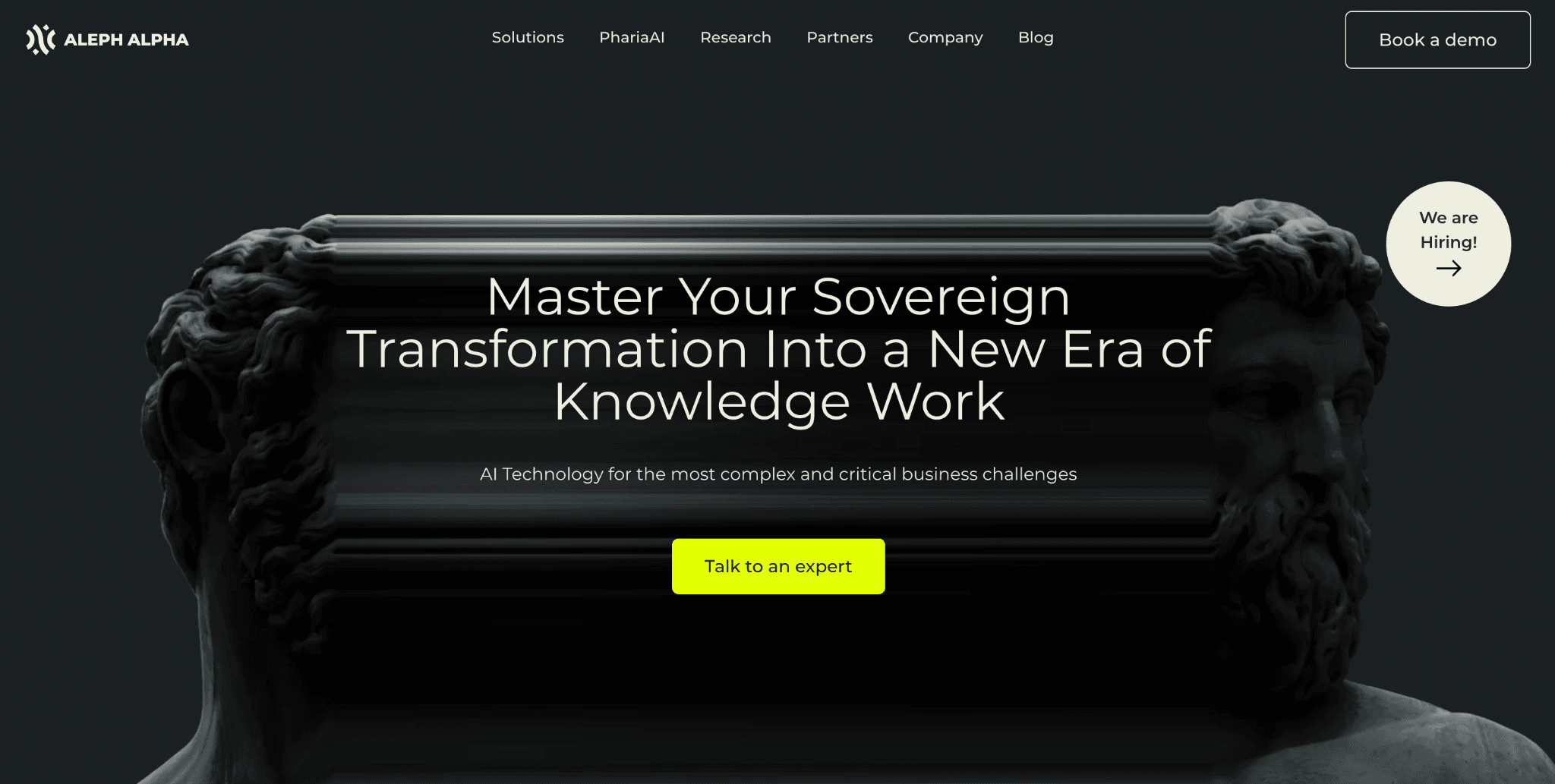
Best for: Government and regulated industries needing transparent AI that follows European data laws
Luminous is a family of large language models developed by Aleph Alpha in Heidelberg, Germany. Designed from the ground up for enterprises and government agencies, Luminous emphasizes data sovereignty and compliance with European privacy laws (it’s built to align with GDPR and upcoming EU AI Act requirements).
The model was first introduced in 2021 and has since evolved into several sizes and capabilities. Aleph Alpha was an early pioneer in multimodality – Luminous can accept both text and image inputs, a feature it had as far back as 2021 (via their MAGMA extension).
A key differentiator of Luminous is its focus on explainability: Aleph Alpha developed an “AtMan” technique that allows Luminous to trace which sources or facts led to its answers, effectively showing the why behind responses.
Key Features:
- European Data Compliance: Built for GDPR and EU AI Act requirements
- Transparency Features: Shows exactly which sources support each answer
- Multimodal Processing: Handles text and images together since 2021
- Hallucination Prevention: Can refuse to answer when sources aren't trustworthy
- Government Deployments: Already used in official city systems and pilot projects
- Multilingual European: Trained across five major European languages
Pricing: Starts around €1 per 5 credits (roughly €1 per 1,000 words). Enterprise pricing customized based on deployment needs.
User Reviews:
"Luminous offers a unique opportunity for transparency and traceability of AI-generated content" - Banking customer on Aleph Alpha
"Culturally neutral... but incredibly stupid, several generations behind. No thanks" - User criticizing creative capabilities on Reddit
8. Velvet 14B - Italy's Sustainable AI Solution
Best for: European businesses wanting energy-efficient multilingual AI for cloud, office, or edge deployment
Velvet 14B is an Italian-developed open-source LLM from Almawave (part of the Almaviva group), introduced in early 2025 as a sustainable, high-performance model for real-world business applications.
Almawave optimized Velvet for deployment flexibility: it’s efficient enough to run on cloud instances or edge devices with limited GPUs, and it’s offered under Apache 2.0 license so companies can freely use and modify it.
In benchmarks, Velvet 14B delivered results comparable to leading 30–70B models like Llama 4 Maverick and DeepSeek R1 – despite being less than half their size.
Key Features:
- Energy Efficient Design: Delivers premium performance with lower computational needs
- European Language Focus: Balanced training across six languages with Italian expertise
- Long Context Support: Handles 128,000 words despite smaller size
- Open Source Freedom: Apache 2.0 license allows free commercial use
- Dual Reasoning Modes: Quick chat and structured reasoning modes available
- Flexible Deployment: Optimized for cloud, office servers, and edge devices
Pricing: Completely free under Apache 2.0 license. Almawave offers paid support and integration services for enterprise customers.
User Reviews:
"Velvet models emphasize sustainability... a strong focus on reasoning and text comprehension" - Tech blog on MarkTechPost
"Velvet-14B (Italian)... exists, but nothing that really competes with OpenAI yet" - User noting performance gaps on Hacker News
9. Devstral - The Open Source Coding Specialist

Best for: Software teams wanting a free AI coding assistant that can explore projects and use development tools
Devstral is Mistral AI’s specialized coding large language model, released in May 2025 as a “research preview” optimized for software engineering. Developed with partner All Hands AI, Devstral is open-source under Apache 2.0, allowing free commercial use. It excels at “agentic” coding tasks: exploring codebases, editing multiple files, and using tools during generation.
Packing 24 billion parameters and a massive 128k token context window, Devstral is powerful yet resource-efficient – it can even run on a single NVIDIA 4090 GPU or a 32 GB RAM Mac for local use. Mistral offers Devstral via API as well, making it accessible to enterprises that want a coding co-pilot with state-of-the-art capabilities at low cost
Key Features:
- Open Source License: Apache 2.0 allows free commercial use and modification
- Multi-File Code Understanding: Reads and edits across entire codebases intelligently
- Tool Integration: Uses development tools during code generation and problem solving
- Large Code Context: Supports 128,000 words of code and documentation
- Resource Efficient: Runs on single high-end GPU or 32GB RAM Mac
- Competitive Performance: Beats other open models on software engineering benchmarks
Pricing: Free download and use. API access available at $0.10 per million input tokens, $0.30 per million output tokens.
User Reviews:
"Devstral's got my full support. It's the only local model under 32B that can actually use tools to gather context... without breaking a sweat" - Developer on Reddit
"Devstral did not work well in my limited software engineering tests. Qwen3 is better" - User reporting mixed results on Reddit
10. Huawei PanGu - Enterprise Industry Specialist
Best for: Large organizations in finance, government, and manufacturing needing customizable AI with complete data control
Huawei’s PanGu is a suite of advanced AI models tailored for enterprise use across a range of industries. First launched in 2021, PanGu has evolved through several iterations; the latest version (PanGu 5.5, as of mid-2025) represents Huawei’s flagship foundation model offering.
PanGu offers five different versions trained for specific industries like healthcare, finance, and government. Each version knows the special language and rules for its field right from the start. The system uses smart switching between quick answers and deep thinking depending on the question difficulty. Built on Huawei's own computer chips for maximum performance and data security.
Key Features:
- Industry-Specific Models: Five specialized versions for different business sectors
- Adaptive Reasoning: Automatically switches between fast and deep thinking modes
- Massive Scale Architecture: 718 billion parameters with 256 expert systems
- Custom Model Training: Full toolchain for creating specialized versions with your data
- Proven Enterprise Use: Already deployed in agriculture, transportation, and manufacturing
- High-Performance Infrastructure: Built on Huawei's advanced AI hardware systems
Pricing: Enterprise licensing through Huawei Cloud. Custom quotes based on deployment size and industry needs. Special government pricing available.
User Reviews:
Huawei’s early tokenizer meant they were essentially handicapping their models from the start - like trying to read a book one letter at a time rather than recognizing words and phrases. This would explain why their legitimate models underperformed despite significant computational investment. Reddit
Definitely possible and the model isn't even very good. Reddit
What are Private AI Models?
Private AI models are similar to usual models like ChatGPT, Claude, Mistral, etc., but these are deployed and controlled exclusively by organizations within their own infrastructure. These models operate independently from public AI services, giving companies complete ownership over their AI capabilities and data.
The main difference between private and public AI models lies in deployment and access control. While public models like ChatGPT serve millions of users through shared platforms, private models work solely for one organization. This setup ensures that sensitive business data never leaves the company's secure environment.
Private AI models come in different forms. Some companies build custom models from scratch using their own data and computing resources. Others take open-source models and modify them for specific business needs. Enterprise versions of existing models offer another path, providing commercial-grade private AI with vendor support.
Key Advantages of Private AI Models:
- Complete Data Security: Sensitive information never leaves the organization's controlled environment
- Regulatory Compliance: Meets strict industry requirements for data handling and geographic restrictions
- Full Customization Control: Organizations decide exactly how their AI behaves and what data it uses
- Industry-Specific Training: Models can be customized for specialized business tasks and terminology
- Access Management: Companies control who can use the AI and set specific user permissions
- Performance Optimization: Resources can be dedicated entirely to the organization's needs
How to Access Private AI Models
Organizations can access private AI models through various deployment methods depending on their technical capabilities and security requirements. The models featured in our list of best private ai models offer different access approaches to suit different business needs and budgets.
Access Methods for Private AI Models:
- Direct Download: Open-source models like DeepSeek R1, Velvet 14B, and Devstral can be downloaded freely and deployed on your own servers without licensing fees
- API Integration: Most models including Mistral Medium 3, Solar Pro 2, and Claude Enterprise offer API access with usage-based pricing ranging from $0.10 to $32 per million tokens
- Enterprise Licensing: Premium models like Huawei PanGu and Luminous provide custom enterprise contracts with dedicated support and on-premise deployment options
- Cloud Platform Integration: Models like GPT-5 Enterprise integrate directly into existing cloud ecosystems through Azure, AWS, or Google Cloud with familiar billing structures
- Managed Hosting Services: Companies can access models through vendor-managed private clouds where the AI provider handles infrastructure while maintaining data isolation
- Custom Fine-Tuning: Many providers offer specialized training services to adapt base models using your organization's specific data and requirements
Get the Most Out of Private AI Models Using Elephas
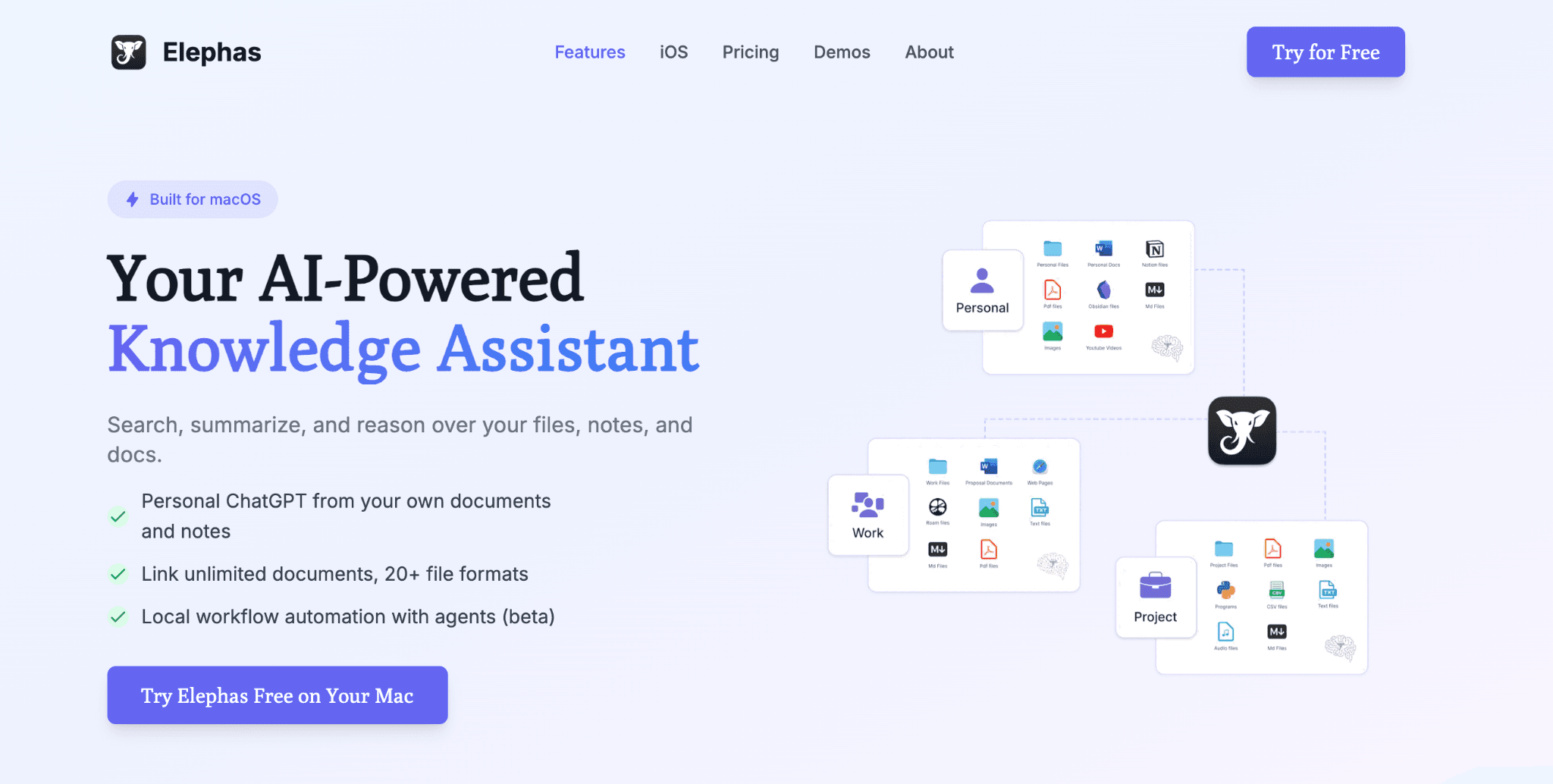
Elephas changes how you work with private AI models by creating a complete knowledge management system right on your Mac. You can connect multiple AI providers or run everything completely offline using local models for maximum privacy and control.
Elepahs combines your private AI model capabilities with automation and knowledge organization. Through its Super Brain feature, you build a personalized knowledge base from all your documents, notes, and research materials, making your AI interactions more relevant and powerful.
For example, you can upload all of your company information documents into Elephas and ask it any question. Elephas not only gives the right answer but also cites the information where it took it from, and it does all this while staying offline, running on offline LLM models.
Key Features:
- Super Brain Knowledge Repository: Creates a comprehensive personal knowledge base by organizing information from various sources, making your AI conversations more contextual and intelligent
- Workflow Automation: Build multi-step processes using AI agents that can search your knowledge base, create diagrams, fill PDF forms, and export results automatically
- Multiple AI Provider Support: Connect to different private AI models including OpenAI, Claude, Gemini, or run completely offline with local models through LM Studio
- Smart Content Integration: Add web pages, YouTube videos, and documents directly to your knowledge base with automatic synchronization across devices
- Advanced Export Capabilities: Generate outputs in PDF, Markdown, Keynote, and text formats while maintaining complete control over your data
- Complete Offline Operation: Run Elephas entirely offline with local embeddings and AI models, ensuring your sensitive data never leaves your device while improving productivity significantly and saving valuable time
Conclusion
We have covered all the best private AI models in 2025. Each model offers unique strengths for different organizational needs and budgets. If you want completely free and powerful performance, DeepSeek R1 delivers GPT-4 quality without any costs.
For enterprise security and privacy, Claude Enterprise provides unmatched data protection with massive context capabilities. European businesses should consider Luminous for GDPR compliance or Velvet 14B for energy-efficient multilingual support. Developers will find Devstral perfect for coding assistance, while Microsoft users can leverage GPT-5 Enterprise's seamless integration.
Choose the model that aligns with your specific requirements, whether that's cost savings, regulatory compliance, specialized industry knowledge, or technical capabilities. However, regardless of which private AI model you select, we highly recommend trying out Elephas.
Elephas can significantly reduce your workload by automating repetitive tasks, organizing your knowledge base, and creating intelligent workflows that work seamlessly with any private AI model you choose, ultimately saving you countless hours of manual work.

Comments
Your comment has been submitted